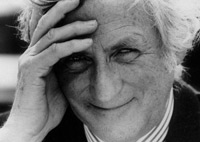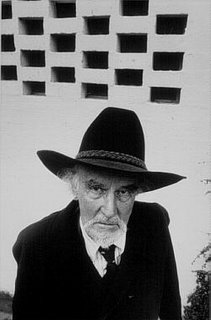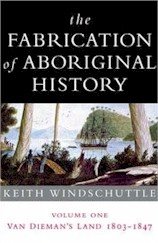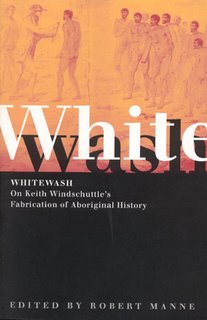The History Wars
 The Prime Minister has recently called for a renewal of history teaching in Australian secondary schools, with the suggestion of making history a compulsory subject in all schools. Mr. Howard is concerned about how we are to preserve, in an increasingly pluralistic society, a sense of Australian national identity, without an overarching and coherent narrative. “I do not believe,” he said, “that you can have any sensible understanding and, therefore, any sensible debate about different opinions of Australian history unless you have some narrative and method in the comprehension and understanding of history. How you can teach issues and study moods and fashions in history, rather than comprehend and teach the narrative, has always escaped me.” (“Summit divides over compulsory history,” The Age 17.08.06)
The Prime Minister has recently called for a renewal of history teaching in Australian secondary schools, with the suggestion of making history a compulsory subject in all schools. Mr. Howard is concerned about how we are to preserve, in an increasingly pluralistic society, a sense of Australian national identity, without an overarching and coherent narrative. “I do not believe,” he said, “that you can have any sensible understanding and, therefore, any sensible debate about different opinions of Australian history unless you have some narrative and method in the comprehension and understanding of history. How you can teach issues and study moods and fashions in history, rather than comprehend and teach the narrative, has always escaped me.” (“Summit divides over compulsory history,” The Age 17.08.06)
Just last week a summit of historians, politicians, and educators met in Canberra to discuss the Prime Minister’s proposal. This seems like a welcome trend but there are some who are concerned about the possible “politicization” of history that may result from such an approach. If Australia is to have an “official” history, if the Prime Minister is to appoint the historians who write the curriculum, if government funding is to be directed to some projects and not others, then whose version of history will be sanctioned? Already the opposition Labor Party is concerned that the government wants to rewrite history to reflect its own conservative world-view. Opposition education spokeswoman Jenny Macklin said in The Age “The teaching of history is very important in our schools but the last thing we want is John Howard pushing his ideology down the throats of our children.” Is this just the opening round in the next campaign of the “history wars”? Debates about the nature of the past are hugely significant in shaping the identity of any people and in charting a way forward into the future. The heart of the argument can be traced back to a phrase coined by Geoffrey Blainey (left) in his Latham Lecture of 1993 and then subsequently picked up by John Howard when he won government in March 1996. Blainey referred to the pessimistic view of Australian history as “black-armband history.” Earlier generations had held a very positive “three cheers for the British and their great accomplishments” kind of history. This at least was the history I was taught at school. There was lots of flag raising, and military uniforms, with the Aborigines somewhere in the background looking on from behind trees, waiting to perform cultural ceremonies to the delight of their newly arrived guests. No blood was spilt (or very little) in the history I learned at school. Words like “genocide” or “massacre” were never used. Blainey held that in reaction to this overly rosy view the pendulum had swung too far the other way and on overly pessimistic view had emerged resulting in an equal but opposite historical jaundice. (It should be noted that black armbands were used in the Aboriginal protest movement in the 1970s, before Blainey coined the term, as a symbol of Aboriginal dispossession.)
Is this just the opening round in the next campaign of the “history wars”? Debates about the nature of the past are hugely significant in shaping the identity of any people and in charting a way forward into the future. The heart of the argument can be traced back to a phrase coined by Geoffrey Blainey (left) in his Latham Lecture of 1993 and then subsequently picked up by John Howard when he won government in March 1996. Blainey referred to the pessimistic view of Australian history as “black-armband history.” Earlier generations had held a very positive “three cheers for the British and their great accomplishments” kind of history. This at least was the history I was taught at school. There was lots of flag raising, and military uniforms, with the Aborigines somewhere in the background looking on from behind trees, waiting to perform cultural ceremonies to the delight of their newly arrived guests. No blood was spilt (or very little) in the history I learned at school. Words like “genocide” or “massacre” were never used. Blainey held that in reaction to this overly rosy view the pendulum had swung too far the other way and on overly pessimistic view had emerged resulting in an equal but opposite historical jaundice. (It should be noted that black armbands were used in the Aboriginal protest movement in the 1970s, before Blainey coined the term, as a symbol of Aboriginal dispossession.)
The person most responsible for this “black armband view” of Australian History, according to Blainey, was Manning Clark (above), the man usually seen as the founder of the approach to Australian History as Australian, rather than as an episode in British history. Blainey maintained that a “guilt industry” had emerged from Clark’s work outsides of the historical profession – in the ABC, in the Australian Labor Party, in educational institutions, and in the High Court. Too much emphasis was being placed, it was said, on the dispossession of the Aborigines, and on the destructive impact on the environment of European civilization. White Australians were racist, sexist, militarist, and exploitative and they needed to make reparations. John Howard, picking up on Blainey’s criticisms came into office in 1996 asserting that “the balance sheet of Australian history is a generous and benign one.” This appealed to an Australian sense of patriotism and national pride and no doubt contributed to a Liberal victory. [Mark McKenna, “Black-armband history,” in Graeme Davison, John Hirst, and Stuart Macintyre, eds. The Oxford Companion to Australian History (Melbourne: Oxford University Press, 2001), 73.]
More recently controversy has broken out over the nature of the dispossession of the Aborigines in Tasmania. In 2002 Keith Windschuttle’s The Fabrication of Aboriginal History made the claim that the “genocide” of Tasmanian Aborigines was a myth and that there had been no widespread massacres of Aboriginal people during the period of white settlement there. He argued that the Aborigines had no sense of ownership of land; such an idea was not part of their mental universe so they could not be said to have had their land stolen from them. The land was “terra nullius” – an empty land, belonging to no one and so legitimately appropriated by the British crown.
Windschuttle’s book created a storm of controversy and seasoned historians of Aboriginal and settler relations on the frontier, such as Henry Reynolds, clashed head on with Windschuttle’s hypothesis, as well as with his historical method and accuracy. Winschuttle became something of a cause celebre among right wing conservatives and The Australian ran a series of pro- and anti-Windschuttle pieces that kept the debate in the national consciousness for quite a while. For its own part The Australian tended to editorialize in favour of Windschuttle and he became something of a figurehead for those who opposed the “black-armband” approach to history. Professor Robert Manne, one of Australia’s leading public intellectuals, has lamented the way that “so many prominent Australian conservatives have been so easily misled by so ignorant, so polemical and so pitiless a book.” [Robert Manne, ed. Whitewash: On Keith Windschuttle’s Fabrication of Aboriginal History (Melbourne: Black Inc. Agenda, 2003), 11. 

The latest move from the Prime Minister continues to stir the pot on our national history. So here we are in Australian in 2006 certain that history matters, and that the generally understood narrative of a nation does indeed affect national identity, politics, education, and a good deal more.
[If you liked this post you might also enjoy reading the following previous posts - Trying to Speak Good Christian in Canberra, Bring the Troops Home, "Wiping Out" the Aborigines, The Proposition and Race Riots in Cronulla.]


5 comments:
While I agree that there is a danger of history education being politicised, I'd like to see a return to history being taught as a pure discipline in primary and secondary schools, rather than under the umbrella of Studies of Society and Environment.
As in any area of life where human views are expressed, it is impossible to remove bias from any recording of 'history'. Clearly, the more points of view you can interact with the better.
I find that too often people try to oversimplify historical issues as this makes it easier to justify a position and to paint groups in broad, black and white, stereotypical strokes.
The way that we would like to “see our world” now is markedly different from the way that society used to view itself and function. Most national boundaries have changed throughout history due to a firmly believed in imperialist mindset that now carries an unpleasant aroma in ‘modern civilisation’.
When the British Empire was expanding throughout the globe, as scores of others had before (think Greek, Roman, and Ottoman etc) they had in their collective societal mind (to grossly generalise) that they were bringing ‘civilisation’ to the ‘savages’ – or some such likewise notions. Unfortunately, in today’s ‘global village’ many of these notions have been turned on their heads. It is not seen as our right to conquer and expand our territories anymore.
This juxtaposition of differing societal paradigms causes somewhat of a moral conundrum for the ‘conqueror’ populace. If it is not right for us to arbitrarily take land, resources, cultural freedom off people today, does it then follow that it was not right to do so in the first instance? Big questions regarding reparation, and rebalancing inequalities naturally follow. In many cases, however, it is easier for people to not want to face these questions or to just want to ‘start anew’ and so we hear spluttering of ‘that was all in the past’, ‘we just need to move on’.
To my mind, as open and honest an appraisal of ‘where we are’, ‘how we got here’, and ‘are there issues that need to be addressed’ seems the best course. In the end though, society en masse can decide what it will. What really gets me is when we try to pretend that the past has little to no bearing of the entrenched relative situations of the various groups in our society today. When we do that we are in effect agreeing with the kind of Social Darwinist philosophy which was twisted by the Nazi regime in WWII.
Here in NZ we are face similar issues, as do Canada, the USA, Israel and the wider Middle East, and anywhere else where a people group has been displaced or conquered. My wife was recently surprised to learn that what was taught about NZ and Māori history in our high school curriculum is not now seen as a very authoritative, or even trustworthy, account and interpretation of events.
Though many people in my country are sick of struggling with our process of creating a more mutually beneficial societal structure – especially because they are so distanced from the historical happenings – it does not mean that the process is a waste of time if we truly believe that all people hold inherent worth – as a Christian worldview would hold. The fact is that there are no easy answers and that there are no completely innocent parties. But all people have value as God’s beloved creation and therefore deserve respect and a valid place in society. If the way society is structured basically holds some in a position of oppression then my instinct is that it is the church’s role to try, as we can, create a better structure. Not an easy job, not a fast one, but one we could better be taking the lead in.
Apologies for the length of this comment, which quickly extended beyond my original intent and the mishmash of ideas. I was stirred by your thoughtful reflection Glen and thought that I would add some thoughts to the conversation. I realise that such a short space is not adequate to really do justice to the subject. I also commend you for taking on such contentious but important issues as they come to the fore again in the media.
Kind regards,
Jacob from Auckland, NZ.
Hmm. well i didnt actually read the whole blog, but if John Howard wants to make history compulsory in schools maybe he should take the class too. Then he might realise the importance of saying "SORRY" to the Aboriginal community.
Good point Soph. What? You didn't read the WHOLE blog? Shame on you girl!
I really enjoyed this article. As a matter of interest I wrote one namely about the impact of European Colonisation on the ABoriginals. All comments appreciated.
xo Billie
http://contentionbycandlelight.wordpress.com/2010/07/11/three-cheers-vs-black-armband/
Post a Comment